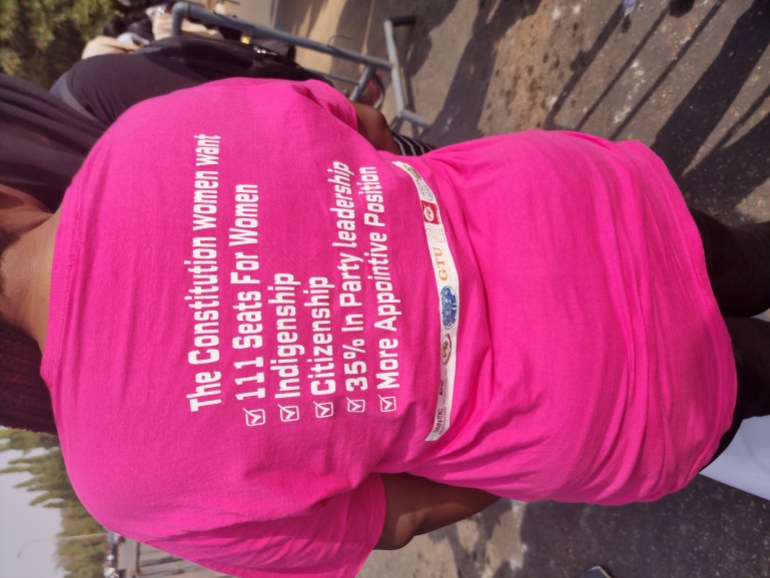[ad_1]
Nigerian girls have converged on the nation’s parliament in Abuja to protest its choice to vote in opposition to the adoption of 5 gender payments.
As early as 8am on Wednesday, lots of of girls confirmed up on the Nationwide Meeting Advanced within the Nigerian capital to show in opposition to the Senate’s selections at yesterday’s structure modification session.
‘’I’m right here [at the protest] as a result of I’m offended,” Nimisire Emitomo, a 25-year-old author, who joined others to sing and chant about Nigerian legislators neglecting their issues on the parliament gates. “Once I noticed the vote yesterday, the very first thing that got here to my thoughts is why do they hate us a lot? They’re actually saying we’re second-class residents,’’
After two years of deliberations, the legislature had voted on a collection of payments to amend the controversial 1999 structure, adopted through the transition from navy rule to democracy that 12 months.
One of many amendments, if handed, would have granted citizenship to foreign-born husbands of Nigerian girls; the Nigerian structure already confers computerized citizenship on foreign-born wives of Nigerian males. One other would have given a girl the best to turn out to be indigenes of their husband’s state after 5 years of marriage.
There have been additionally provisions to assign 35 p.c of legislative seats to girls, in addition to reserve 35 p.c of political social gathering management, for ladies.
Protesters stated the rejections have pushed again years of efforts by feminine lawmakers, lobbyists and activists.
For months, Chioma Agwuegbo, govt director of TechHerNG and different activists had held consultations on the payments with legislators, civil society teams and varied different stakeholders. All of their efforts ended up being futile.
’They shut the payments down with a vehemence that really scares us,’’ stated Agwuegbo, one of many organisers of the protest. ‘’The explanation why girls are out at present and tomorrow and maintain having this dialog is as a result of girls are usually not simply good just for votes. You can’t lead us with out us.’’
Girls and ladies make up practically half the whole nation’s inhabitants in Nigeria however are grossly underrepresented in Nigeria’s political house. Solely 19 of the 469 legislators presently serving in Nigeria’s bicameral legislature – a meagre 4 p.c – are feminine.
No lady has ever been elected governor or president and solely a handful of cupboard appointments are handed to girls. Consequently, the West African state is ranked 180 out of 190 in line with the Inter-Parliamentary Union.
 A Nigerian lady protests outdoors the Nigerian parliament [File: Chioma Agwuegbo, TechHerNG]
A Nigerian lady protests outdoors the Nigerian parliament [File: Chioma Agwuegbo, TechHerNG]Tuesday’s vote was the fifth try to evaluation the 1999 structure since its adoption. The newest evaluation started in 2020 and the committee overseeing the amendments was led by Deputy Senate President Ovie Omo-Agege. It submitted a complete of 68 payments final week.
Of the 68 payments voted on, 49 have been handed, together with a invoice on monetary autonomy for native governments, Nigeria’s third tier of governance. A invoice to cap the timeline in prosecuting prison and civil instances was additionally rejected.
Activists have stated the vote in opposition to payments granting girls extra autonomy was symptomatic of what’s nonetheless a deeply conservative society.
‘’It’s clear that [the rejection of the bills] is a continuation of patriarchal construction within the society,” Ayisha Osori, director of Open Society Foundations, informed Al Jazeera. “As numerous as Nigeria is, when it comes to how divided we appear to be in relation to ethnic, non secular and sophistication divides, one factor that unites Nigerians greater than something is the widespread hatred for ladies.”
Sponsors and lobbyists of gender-related payments normally face an uphill battle within the legislature resulting from non secular sentiments. Final 12 months, the same invoice searching for to advertise gender equality in employment and property inheritance was discarded for the third time after male senators from the northern area complained that such payments have been ‘’anti-Islam”.
To enact constitutional modifications, the vote outcomes need to be permitted by a two-thirds majority of the 36 state parliaments after which despatched to the president for assent. The protesting girls are asking that Tuesday’s selections be reviewed earlier than that step is taken.
[ad_2]








Leave a Reply